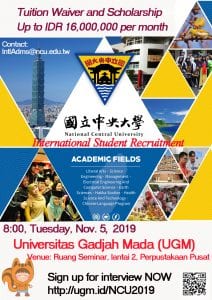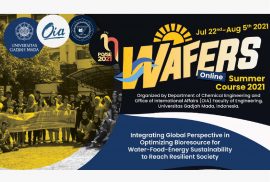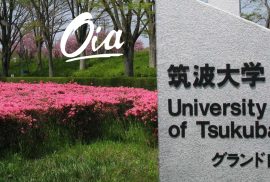In the early days of the COVID-19 pandemic, Indonesia experienced many shortages PPE, ventilator, and also COVID-19 rapid test kits. This is captured by experts to produce independently and assist medical personnel in dealing with a pandemic in various health facilities. Universitas Gadjah Mada’s competence in handling the pandemic will be even stronger with the support of international networks. The international insight will provide many benefits for students and strengthen their network in the future. the implementation of the International Summer Course of Humanitarian Engineering: The Role of Engineers during the Pandemic Era will be a gateway for broader international cooperation for the entire UGM academic community.
Conservation of Saujana Pusaka (Heritage Cultural Landscape) is a flagship in the field of heritage conservation in the Department of Architecture and Planning, Faculty of Engineering UGM. Heritage Saujana is the inextricable unity between nature and manmade heritage (tangible and intangible culture) in space and time. The beginning of learning about this science has been carried out at UGM, since 2004 when the Center for Heritage Conservation, Department of Architecture and Planning, Faculty of Engineering, UGM organized the International Field School on Borobudur Heritage Saujana (IFSBHS). As of 2017, IFSBHS has been held 9 times2. IFSBHS participants consist of students, local government employees, and observers from various countries, including Indonesia, Hong Kong, Japan, Malaysia, Egypt, France, Thailand, and China.
WAFERS summer course 2021 raises the challenges from three nexus of water, food and energy for young engineers. This virtual course will give students a broader perspective on water-food-energy sustainability (WAFERS) issues as well as offering a number of solutions such as changing consumer behavior as well as adopting suitable technology to tackle numerous environmental problems.
Covid-19 pandemic has a tremendous impact in which it affects life system. The invention of the Covid-1 9 vaccine is of great help to overcome the pandemic. However, the vaccine itself is not enough. A good immune system is needed during this pandemic era. Improving our immune can be achieved by consuming various and nutritious foods. Furthermore, functional foods can be incorporated into our diet to maintain health and improve our immune system. Functional foods can be both natural or obtained through processing.
The preservation of cultural heritage both tangible and intangible is not only done by caring for the existence of this heritage but how to increase the attractiveness and effectiveness of cultural heritage for various construction purposes. For example, at Prambanan Temple, not only serves as a historical monument for Hindus and a tourist attraction, but visitors can also enjoy the Ramayana Ballet performance art, which is also an intangible cultural heritage of our country, which has taken advantage of the process of creativity and touch of technology so that it becomes an interesting spectacle as well as the inculcation of cultural values. Likewise, the culture of healthy living that is applied by the Indonesian people in the use of herbal medicine, in the modern era with a touch of herbal technology no longer ancient but become a practical herbal drink and by today’s lifestyle.
Warm greetings from Seoul, Korea!
Greeting from Tsukuba!
Greetings from Science Po-Lyon!

National Central University (NCU) was re-established in Taiwan in 1962 as part of the country´s response to the International Geophysical Year. The school was initially located in Miaoli, but was relocated to Jhongli in 1968, and gradually developed into a comprehensive university. NCU has now become Taiwan´s leading school in the fields of geophysics and space science and was selected as one of the major research-oriented universities in 2001. It is a first-rate university with solid international qualifications.
Now, NCU would like to give an opportunity for International Students who interested to apply application for the recruitment of international student, National Central University, Taiwan. The interview will be held on :
Sciences Po’s exchange program welcomes more than 1,500 students each year from 410 partner universities around the world. At the Bachelor’s level, exchange students can choose from Sciences Po’s seven campuses: Dijon, Le Havre, Menton, Nancy, Paris, Poitiers, and Reims. Exchange students at Master’s or Ph.D. level study on the Paris campus.










Recent Comments